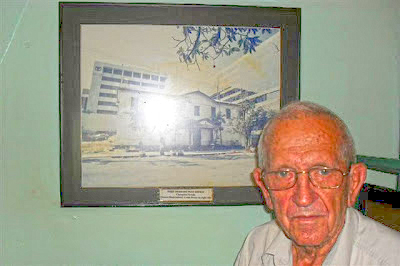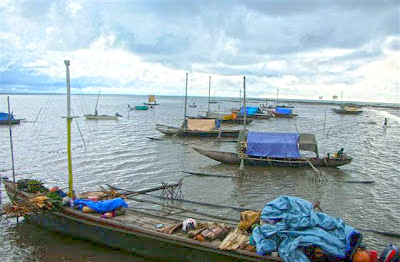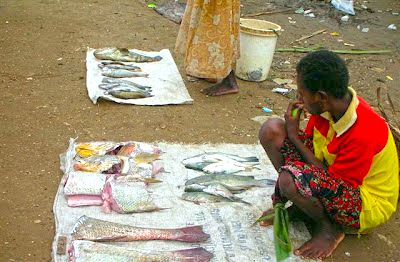By MALUM NALU
Remembering Daru the way it used to be
In the pre-independence days, Daru was an exotic melting pot of expatriate traders, planters, crocodile hunters and even missionaries.
Former kiap (patrol officer) and Member of the first House of Assembly Graham Pople, whose first posting was Daru in 1956 as a 21-year-old, once told me in 2010 that Daru was still the love of his life and his all-time favourite place in PNG as a kiap.
Pople, who later became a citizen of Papua New Guinea, died in February 2019 aged 83.

This is despite it being disparaged in the past as “Siberia” – a place where kiaps who did the wrong thing were exiled there and forgotten.
From Daru, Pople served the whole of the massive Western district (now province), including crossing the border to the then Dutch New Guinea.
These included Kiunga, Lake Murray, Balimo, the Star Mountains and many more.
In his yet-to-be-published autobiography, The Popleography, Pople writes about arriving in Daru on a Qantas Catalina flying boat in 1956 and how he fell in love with the place.

“At the time of my arrival in Daru,” he recalls, “the expatriate population consisted of the DC (district commissioner) and his wife, an assistant district officer, a patrol officer with wife, medical officer and wife, European medical assistant, and agricultural officer and family, and a clerk also married.
“There were we three cadet patrol officers – all single.
“There was Lenny Luff who owned a store, who was married with grown children and their families; the Maidments who were both in their 80s but hale and hearty, and running another store; and Peter Day, who ran the BNG Trading Emporium.
“Off the island, there was a floating expatriate population of traders, planters, crocodile shooters and even missionaries.
“In addition, Australian Petroleum Company (APC) was working in the area and their boats and personnel often dropped into Daru.”
Pople remembers that the indigenous population living on the island consisted of about 250 people classified as mixed race (and thereby entitled to drink) and about 200 villagers who were not entitled to partake of intoxicating beverages.
However, this did not stop them from making their own local beverages, which are known as gamada and tuba.
“The people living at Daru are a most-polyglot group,” Pople adds.
“Daru is only 14 hours sailing from Thursday Island and has been a port of call for pearling luggers and like, since the pearling industry began in the Torres Strait.
“The Kiwai were always hospitable and therefore a population has grown that traces its ancestry back to Portugese, Australians (original), and Australians (recent), Japanese, Malays and many others.
“Also, when Lieutenant Governor McGregor arrived from Fiji, he brought his senior NCO policemen from there, and some of them settled at hospitable Daru.
“The Tabua clan are the descendants of one such family.
“These people, being the first I had anything much to do with in PNG, have a special place in my memory and affections.
“One such was Badia Travertz, who was an old man in those days.
“He was a shipwright and was in charge of the slipway and the basic workshop associated with it.
“He was a most-interesting person and I used to enjoy sitting down in his workshop and listening to his stories.”
Pople talks fondly about his old mates such as George Tabua and Arthur Wyborn, originally from the British Islands and who later become a Member of Parliament, and whose family still live in Daru.
There is also Ebia Olewale, who “later became a very-eminent politician and was one of the founders of the Bully Beef Club along with Michael Somare, and a leader of the nation into self-government and independence”.
“He was rightly knighted for his efforts.
“I remember Anzac Day in 1956 and the school children marching and saluting the Australian flag.
“I have photos of this ceremony.
“Ebia appears in some of them as a very-young and fresh-faced young man.”
Daru, being an island, had a jetty, but because of the shallowness of the water it extended for some 200 metres or so into the channel.
“To make unloading easier, there was a railway line laid out between the end of the jetty and the government store building,” Pople says.
“Several carts were used to transport goods backwards and forwards, being man-powered (usually prisoners).
“This jetty was a favourite night fishing spot where the police and other government workers made their assignations with the local maidens.
“Daru was a prison island where the worst of the prisoners from throughout Papua New Guinea were sent to serve their terms, it being reasoned that no one could escape from there and remain at large.
“There was a very well-attended church on the island, the London Missionary Society (LMS), headed by a very-dedicated but sensible Gordon Price.
“He had a very good following from among the residents and each Sunday, the church was packed”
Apart from the hard foot slogging, Pople also spent a lot of leisure time fishing and shooting crocodiles – two things for which Daru is famous for – after which there was always a plentiful supply of beer.
The barramundi, probably the finest eating fish anywhere in PNG, abounds in Daru and Western province.

But the area’s real wealth lies in crocodile hides; Daru may be the only place in PNG which lives ‘on the crocodile’s back’.
In 1959, while on leave in Australia, Pople was advised that his request to return to Daru and the Western district had been refused and he was to be posted to Western Highlands.
Despite his pleas to go back to a place he had grown to love, he was advised to go to the Highlands and broaden his experience.
Daru, to this day, has a special place in the heart of the now 75-year-old Pople
Aiyura National High School students from the 80’s may recall that, for a period of time, we were fortunate to enjoy Barramundi fish from Daru thanks to the kindness of SIL Aviation who would occasionally fill a flight returning from Daru, after dropping off SIL staff, with the fish for us.
Great memories, Mr Kunert, that will live forever in the hearts of us ex-Auyura students of the 1980s.
Great read.
My time in PNG was much later than so many.
Had the privilege of flying for a few ex kiaps, John Balderson, and Tony Locke (friends), committed, strong guys who really did play a big part in the development of this fab country.
More often than not you find people who worked, lived in PNG in a conversation.
My takeaway is that those who worked there, lived there, have an appreciation of mankind in its best form.
As I said before, to be doing mountain ops delivering caskets, bodies, supplies and equipment, even ferrying a sick child to the nearest med station; when a villager has nothing as we know it, when he stands there with tears in his eyes and in gratitude gives you a chipped enamel bowl full of mountain oranges:That is love.
As a helo driver, (a rookie) heard the horror stories of aviation in PNG, thought good place to avoid.
Long story.
But as it turned out, I survived, many never made it; scared myself s… less on one or two occasions, made the rank of Chief Pilot, lived to tell.
YES, part of my privileged life to live with the realities, fragilities, and the beauty of working in nature.
Praise the LORD.
Thank you for the memories, David.
Re reading the DARU bit. I spent lots of time there.
To have a slab of cooked Barra that hangs over the edges of the plate . . . can it ever be better?
Surveys for the Malaysians, Brits looking at timber prospects, bamboo quality, a great time.
Vanimo Hotel with the mouldy walls and cold SP worth being there.
Delivered the first particular type of a helicopter, more like a Ferrari, was fabbo,for an outfit of nationals in aviation services back in those days.
The WX,with respect to aviation, teaches you observation, and I think respect of your surroundings, and above all else to backtrack when things don’t go as you would like and help you to survive.
As BALUS we know of the many who did not make it, whether it was in peacetime or conflict. However, even today, it is a challenging frontier, even to those who flew in Vietnam. Papua New Guinea is a whole new ball game.
Praise the LORD.
I can see that you greatly enjoyed your stay in Daru, David. Thank you for the memories.
I remember George Tabua and Arthur Wyborn and the people Pople mentioned, but I have no memories of Daru being a beautiful place. I remember it as an island of mud and mangroves of no pictorial interest, and certainly not as beautiful as the islands of Milne Bay which were tropical pearls of moonlight and palm trees and blue lagoons and white coral beaches and beautiful island girls. But one feature Daru did have going for it was the people. The Kiwais of Daru were friendly and hospitable, and they were amazing sailors. They could take their sea-going double outrigger canoes anywhere across the Torres Strait. They were amazing navigators. They had no modern navigational aids like compass, charts, GPS, sextants or anything else. Yet they knew the location of every reef and rock and coral cay, the nuances of current and tide, and knew where they were in the open sea by the colour of the water, the shape of the waves, the flight paths of sea birds and so on. and at night by the sequence of horizon stars. They were amazing sailors, and with all the other friendly Kiwai people, that is how I remember Daru.
Thank you for the memories, Chips.
When I was hospitalised at Port Moresby General Hospital in February 2015, the patient in the opposite bed claimed that his grandfather came from Tasmania in Australia and was posted to Daru as a kiap.
As Daru was getting crowded, he was told to move out, so he shifted to Kikori where he lived with his Daru wife.
The family built the airstrip at Kikori and set up a trading post. His name was Senior and it was William Senior I met at the hospital.
The family remains in Kikori and he had a lot of stories to tell about the place.